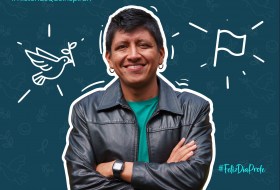News
The Power of Education for Peace, Memory, and Photography
In the classrooms of this institution, day after day, stories are woven that transcend academics and touch the heart; stories that heal and help us recognize ourselves, thereby transforming the lives of those of us who inhabit this institution where dreams come true. For this reason, we invite you to learn about the following anecdote directly from its protagonist, Professor Jaidiver Ojeda, who shares a significant event from his role as an educator. With this story, we kick off our special for Teacher's Day, #StoriesThatInspire, built from the very heart of our Alma Mater.
At Unicauca, we think, educate, and act for peace, fostering various initiatives with the goal of significantly contributing to the construction of the much-desired peace in the department of Cauca. Thus, several professors have taken on the commitment to educate for peace, including Professor Jaidiver Ojeda, a political scientist and master’s in history, coordinator of the Comprehensive, Social, and Humanistic Training Program (FISH), and a member of our Peace Commission. He shared with us how, through a memory exercise involving photography, he was able to recognize and understand part of his history, as well as the reasons behind his academic interests.
"I remember a student brought a photograph from when he was very young, a simple photograph of a child in a house with his two parents. He then told us the story behind that photograph. We asked, 'What does the photograph signify? When was it taken?' He shared with us that his parents told him that the photograph was taken in the year 2000, when they arrived in Popayán after being displaced from a municipality in southern Cauca,” Professor Jaidiver recalled, emphasizing the power of memory. “When I heard that story and connected the date of the year 2000, it reminded me of what my family and I experienced because it was the same year we arrived as displaced people from Putumayo to Popayán,” the professor added with a poignant tone in his voice.
Professor Jaidiver narrated how, in the year 2000, Popayán became one of the cities receiving displaced people due to the paramilitary offensive in southwestern Colombia. This event caused many families to arrive in the city and settle on the outskirts, with some occupying land and leading to the formation of settlements, such as Comuna 7. This highlights the importance of recognizing these memories in daily life, as many people around us have experienced displacement.
"I later understood why these are the topics I work on in terms of research, pedagogy, and education. I realized and have been understanding, through the process of recognizing how these stories and memories are the subjects that interest me. Not only out of academic interest but also out of personal interest and a political stance on the resolution of the armed conflict. That's why I commit to working on memory, peace, education, and pedagogy," said Professor Jaidiver, highlighting that it is often difficult to identify and recognize oneself as a victim of violence, as many of us have been affected by the war, directly or indirectly. However, he emphasizes the opportunity that classrooms provide to address these issues, work on them, and, to some extent, heal them. Impressive, right?
It is truly beautiful to reflect and engage with our professors to get to know them a little better, from a perspective that can even be perceived as more intimate. And we, in the context of Teacher's Day, which we are about to celebrate on May 15, wanted to highlight anecdotes from different professors who, through their teaching, contribute to transforming the lives of their students and who, through their work, also experience personal transformation: it is undoubtedly a collective process.
Today, with this first installment of these inspiring micro-stories, we begin to express our gratitude for the work you do every day. It is thanks to you that we can build dreams and contribute to the development of a more just and equitable society, while strengthening this university of excellence and solidarity, which is highly committed to building peace, reconciliation, and preventing repetition.
For more information:
Program of Integral, Social, and Humanistic Education
Email: componentefish@unicauca.edu.co


